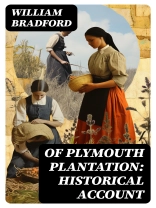William Bradford’s ‘Of Plymouth Plantation: Historical Account’ is a seminal work that chronicles the experiences of the Pilgrims who settled in America. Written in a plain yet eloquent style, the text offers a first-person narrative that blends a meticulous historical account with profound theological reflections. Bradford’s detailed observations from 1620 to 1647 provide insights into the daily struggles, spiritual convictions, and community ethics of the early settlers. This work is not only a historical document but also a vital piece of early American literature, emphasizing themes of faith, perseverance, and communal governance in the face of adversity. As a leading figure of the Pilgrim community and the second governor of the Plymouth Colony, William Bradford was intrinsically connected to the events he documented. His Puritan faith and deep commitment to religious freedom influenced his writing, evident in his provocation for moral and spiritual introspection within the community. Bradford’s exile from England and subsequent journey to the New World profoundly shaped his perspectives, making him a reliable chronicler of this foundational chapter in American history. This book is highly recommended for anyone interested in understanding the roots of American society and culture through the lens of early colonial struggles. Bradford’s work not only provides historical insight but also invites readers to engage with the principles that shaped a nation, making it an essential read for scholars, students, and history enthusiasts alike.
Yazar hakkında
William Bradford (1590-1657) was a notable figure in American colonial history, most renowned for his leadership in the founding of the Plymouth Colony in Massachusetts and his extensive written account of its inception and first decades. His manuscript ‘Of Plymouth Plantillery Plantation: Historical Account’ stands as a fundamental work in American literature and history, offering a unique perspective on the experiences and ethos of the early Puritan settlers. Born in Yorkshire, England, Bradford was a committed member of the Separatist movement, which sought religious autonomy from the Church of England. In 1620, he embarked on the Mayflower, leading to the establishment of Plymouth Colony, where he subsequently served as governor for several terms over three decades. Bradford’s literary style in his historical account is noteworthy for its clarity, detail, and reflective qualities, combining a chronicle of events with meditations on divine providence and communal ethics. Though his text was not published until the 19th century, it has since been recognized not only as a source of early American history but also as a profound cornerstone in the canon of Puritan literature. Bradford’s legacy as an author and leader continues to influence understandings of American identity and foundational democratic principles.












